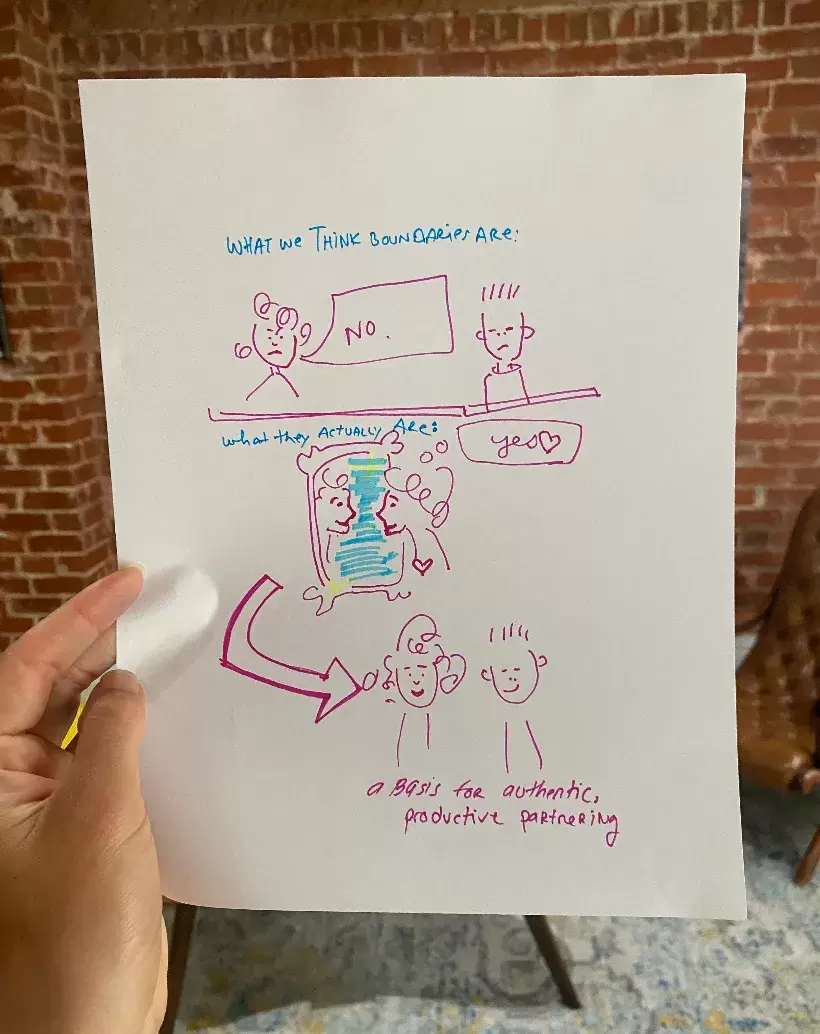|
First, ‘shadow.’ What does that mean?
Your shadow is a collection of your behaviors, patterns of thinking, ways of relating, and lenses of perception that aren’t welcomed by your conscious self. They’re the parts that you don’t think are good enough, you’re afraid you can’t control, and/or are related to experiences that are too painful to face head-on. You guessed it, not all of us are rolling with the same level of shade. Some of our shadows are pitch black, others just a fuzzy, beige’y gray. The ‘darker’ it is, the harder it is for you to see it, and the more fear (anxiety) you likely wrestle day-to-day. Seeing your shadow aspects are acknowledging them as part of the spectrum of your experience and expression. It’s cute — we really do want to be good people. We so badly want to be that we’ll exclude parts of ourselves that might compromise us *thinking* that we are. The aspects of yourself that you banish to your shadow aren’t erased from your expression or experience. I like to explain shadows like dinosaur tails. Big ol’ bulky ones. You, as the dino, set things up with your hands. Then you turn around and knock them over with your tail. But, because you can’t see your own tail, you assume somebody or something else is knockin’ your stuff over. Carl Jung says it a little more grown-up’ly -- ‘Until you make the unconscious conscious, it will direct your life and you will call it fate.’ Let’s look at some examples .Example 1: :Most adult humans have a fairly natural sexual urge. Our culture doesn’t really honor that inner experience and so we learn to suppress it into a shadow. Your sexual shadow might show up as you being critical of others who have a more open sexual experience. It might be distorted into some kind of behavior like secretive porn usage. Or you might ‘do nothing’ that shows signs of suppression and instead lose access to things that come with that kind of energy, like creativity and vitality. Example 2: I’ll put this plainly -- darling, most everything that you’re judging in someone else is yours. Here’s an example — “My boss acts like he knows everything. He never listens. It’s his way or the highway..” You will 100% think this is who he is. And he might be. And yet, in most cases, if you looked for it, you’d probably find those same patterns somewhere in your own behavior. Maybe you’re that way with your kids. Maybe you’re that way about your religion. Maybe that’s the flavor of your inner dialogue. Until you ‘integrate’ that aspect of yourself and Own it, it will Own you. That means that you’ll keep running into it in life and feeling some-type-of-way about it until you come to 1. See. 2. Accept. 3. Forgive. and 4. Start to change your own behavior. Example 3: ‘I’m just a lil lamb and big, bad wolves keep getting me!’ This is one of my fav shadows to light up. Maybe you tried what I suggested in #2 and you’re like, ‘No, I am not a raging a$$hole. I’m actually a good person. That stuff isn’t me.’ Good, I’m happy you’re able to know that. Your shadow here then is DENIAL of your power. It’s likely a pattern you learned through fear and pain. You probably gave away AWARENESS of your power for real reasons back in the day. Here, the shadow is not being aware of your power to do something about your situation. You’ve abdicated your truth, ability to stand up for yourself, and/or belief in alternative possibilities. (Of course, there are instances more complex than this, so please know I respect that and am happy to hear about situations you find outside of these short-post simplifications.) You use a lot of energy keeping something in your shadow. It’s like constantly fidgeting with a shirt that you think looks a little too tight or revealing. You can’t relax. You might also be mildly to completely terrified of life. Your shadow is made of natural things you can’t control (as in example #1), ‘bad’ patterns you don’t think are ‘right’ (like #2), and your bad-ass and complete claim of power, worth, and intelligence (#3). Why wouldn’t you be a little wary of life with that mix? Shadow work is coming to see these parts are legit and lovable, all of ’em. No matter what your mix of #1’s, 2’s, and 3’s, you can find peace with them. Which is the same as finding peace with yourself. Which is the same as finding peace with life. Can you be shadow-free? I don’t know, but I wouldn’t want to be. ..Although at one time I did want to be. But that’s because part of my shadow was thinking that shadows were bad. Nah babe, they’re the yang to our yin. Yes, of course, tidy up the parts that rain on your parade and the parts that aren’t respectful to other people. But the rest, f’n celebrate it. The shadow contains some of the coolest parts of being human — raw aliveness, a sense of adventure, a portal to infinite potential, the end ranges of emotion, creativity, individuality, sexuality, and alllll the joys of creaturehood.
0 Comments
Boundaries are the foundation for trust in yourself and thereby trust in others and life. Effective ones come from an honest awareness of yourself. We’ll start by exploring what that is.
An honest awareness of yourself is acknowledging: what you like, what you value,how you feel, what you want, and what’s right for you right now. It’s not: what you *think* those things should be, what they are for you partner, mom, neighbor, or boss, what they useta be or might be later, or even use what you *think* they need to be for your lovers ‘n friends. Our culture trains people away from that honest awareness. We’re led to believe there’s a ‘right’ way to think, be, feel, or do that’s different than what we’d do naturally. Our schools, media, and language quietly encourage us to stifle our real selves and front the ‘right’ thing instead. Don’t worry, you can find and cultivate the awareness of yourself again with practice. It looks like these kinds of habits: taking a pause before you order the same lunch again and sincerely asking yourself what you’re hungry for today. You can’t have real boundaries unless you know yourself. What would you be advocating for if you didn’t? An honest awareness of yourself tells you what you want to share, ask, and protect and why. It identifies what you need to function and what you want to feel satisfied. Knowing that creates the desire and ability to communicate it when necessary. That communication makes it possible to authentically connect and effectively collaborate. Letting yourself hear and see yourself drastically improves your ability to interface with everything. It’s the first step in establishing boundaries. Boundaries honor yourself. Not who you think you should be, not who you’ll one day become, not who your dad needs you to be. You. You right now. You with all the contradictory ways you think and feel. The genius and dreams within you. The strange or unproductive choices you make. The love in your heart. The embarrassing inner struggles, missing clarity, and general overwhelm. The gifts, experiences, questions, answers, pains, pleasures. You without a bit excluded. Honoring allll those might seem like the worst thing to do. One because, oh sh!t, you’ll have to acknowledge them as part of yourself. Two because, oh sh!t, wouldn’t you rather be ‘better’ than that? Shouldn’t we start with who you could be? Nope. This is where we start because that’s self-respect. Boundaries usually make us think of other people respecting us, but they’re actually how we respect ourselves. Our selves are not the cookie-cutter, paper doll, instagram-filtered versions we think they should be. Our selves have varying degrees of complexity, depth, discord, and mystery. The only way to bring those pieces into harmony and working order is to see, accept, and love them as they are. You can’t chop off your shadow. You can’t delegate your pain. You can’t live anyone else’s story. You’re you. You with the pieces you love, like, hate, hide, deny, and project. Real, true, healthy boundaries start when you begin to accept you’re not going to be nor would you want to be the ‘front’ you think you should. Self-respect begins with saying, “Hey, you. You with the shiny parts, gray areas, and dark shadows. It’s great to meet you. I’m looking forward to becoming good friends and doing this thing together.” It’s only by valuing your whole self that you can create a life that fits. You have to take the mixed bag because, let’s be real, what choice do you have? You can’t go anywhere without you. And to be real’er, you wouldn’t want to leave anything out. Your angels and demons are two sides of the same coin. Can’t have one without the other. No, I’m not saying those rough and heavy pieces will always be that way. I’m saying you gotta love ’em to transform them to something higher. I bet you didn’t think we’d be here in our boundaries conversation. Went a lil deep, didn’t we? This is how I found to home-grow ones that are natural and easy to have and maintain. Loving and respecting yourself make honoring what you need and want mind-blowingly obvious. Boundaries reinforce lines that matter because You do. Boundaries are inside first and foremost. They establish gardens where you can tend to your heart, mind, soul, and ability to be in relationships. It’s cute, I know, but it’s the truth. Boundaries exist to allow you to cultivate yourself and your life in a way that’s meaningful to you. Boundaries emerge from an honest awareness of self. You won’t tend to a garden about authentic communication unless you acknowledge that it’s hard for you to give and receive it. You can’t allocate resources for music until you accept that you feel better about life when you’re making it. You aren’t going to let that old relationship fade except for when you see that it’s preventing a new one, which you admitted is important to you. Being so-honest-with-yourself-it’s-funny is essential to boundary’izing your inner world well. That means being open to hearing who and what you like, even if it seems inconvenient at first. There’s no way you can use boundaries with other people until you see and respect your personal experience. Don’t worry, after you get done laughing about who and what you’re surprised you actually don't like, it doesn’t mean you have to do anything. Those changes come naturally over time. For now, just take yourself by the hand, bring you out to where you can see you, and let things be what they are. The meaningful gardens and the this-is-how-it-really-is info create a possibility for you to love yourself. That means you can BEGIN to take care of yourself as you are, warts, tiaras, and all. This is self-respect. Through this process, you begin to see life with less fear and more clarity. All of that adds up to better decision-making and a belief that you can do new things, hard things, and anything’s. Wahlah! Now your boundaries are complete. …huh? I know, we didn’t talk about about how to tell mom you aren’t coming to Christmas or that you need your boss to delegate differently. I didn’t tell you how to control your spending or follow your dreams. There’s not one bit about anybody else up there for one simple reason -- once you learn how to see, respect, and love yourself as you are, things get pretty simple. You come to more readily know what’s right for you and have a growing desire to communicate and act accordingly. No, it’s not instantaneous. Yes, you’ll stumble. Still, it only takes a few success stories to start to believe in yourself in new, powerful ways. Your relationship with everything changes because your relationship with yourself is healthier. Boundaries are a natural expression of self-love and self-respect. You probably wouldn’t have believed that acknowledging you don’t really like Aunt Paula, you love karaoke, or you need more sleep would translate to being able to tell your partner you need to off-load that project, your lover you want to cuddle more, or your dad you already heard that story. Still, the only person that needs to respect you and your boundaries is yourself. Now you have a pathway to real change. My intention in this article was to assist you in healing the root cause of non-existent or poor boundaries. Welcome home ❤ My own healing journey, intense desire to help, and divine guidance brought me to the topic of boundaries. I’ve worked with clients since 2016 to organize their minds and habits, transcend limiting beliefs, and break frustrating patterns. If you’d like more information about what working together is like, book a free info call at http://habitbook.com/ Being nice isn’t always nice.Most people who are nice to be nice (rather than nice out of sincere and sustainable caring) become tortured by this self-imposed protocol. They do things they don’t want to. They say things they don’t mean. They defer their inclinations, instincts, and interests to accommodate people who likely don’t care or are stuck in the same martyr pattern.
Original Photo, New Orleans 2022I’m not saying be mean. I’m saying being nice-for-nice’s-sake keeps people in dynamics, relationships, and jobs they would have naturally left or evolved through honest participation. What is nice really? What do we actually mean to do?I think the true point is to remember that other people are people, too. We all are important. It’s being considerate of someone else’s experience. The wear and tear of nice-for-nice’s-sake show up when that consideration is at the expense of your own experience, your own truth. We only think that our own truth isn’t nice though, right? Isn’t it kind of nice to know what’s really going on? Isn’t sorta nice to be given the opportunity to respond to what someone really thinks and feels? Isn’t it a bit nicer if we give ourselves and each other the grace to be human and not take things so personally? Being nice to others without being honest with yourself and in your expression isn’t actually nice. It’s control. Being honest in your expression doesn’t mean you’re out there knocking over other people’s sandcastles. You’ll likely be more considerate of others than when you were nice because you’d have a framework for respect… because you respect yourself. You can’t give what you don’t have. As your behavior moves to more authentically represent your actual preferences and feelings, your life will reorganize toward people, circumstances, and things that you truly like and enjoy. Which makes tending to them a lot easier and life a lot more exciting, right? How to implement:
Thank you for reading ‘n being ❤ I’m delighted to produce original content for people who know they’ve got something inside ’em to give. Hey & love @ new world leadersVisit habitbook.com to book a free info call or schedule a session to transform your communication patterns If you find yourself in a season of chaos, discomfort, confusion, or even pain, these questions might help you steer more confidently:
➖What do I want this to mean? 🛳What does this obstacle block? ➖Why might or how could I *want* it to be blocked? 🛳What becomes vulnerable or unknown beyond this point? ➖Who & what do I need to forgive? 🛳Why I am I committed to this breakthrough? ➖What might it be like to allow more grace? 🛳What can I be grateful for or in reverence of relative to this experience? Original content and photo, Shaylee Edwards 2023 This one’s for you if you have a pattern of committing to epic (or even basic) changes and not really following through.
You probably think that when it’s time to accomplish something or change, you should *just* commit. Declare, own it, do it. Force or fail. Rugged, do-or-die commitment. As if that wasn’t extreme enough, I bet you make those commitments when change is desperately wanted. Declaring from that low point might influence your commitments to be overly ambitious and unreasonable, since you likely want to get as far away as possible from where you are. In any case, you mean it — “This time I’m gonna do it!” Do any of these sound familiar:
I get it. One, from my own life, and two, from supporting people for almost a decade in behavior change. We *think* a sincere declaration to commit will summon the change gods. And you know what? Sometimes it does. Sometimes for some people, it does. However, if it hasn’t worked for you, here are some other steps to try BEFORE you commit:
Let’s be real, all this post did was give you permission to step outside of what you *think* should be and to work with what is. Or rather, it reminded you you can give yourself permission. Bonus Q’s: How else are you thinking about what you could do or should do in ways that doesn’t actually help yah out? How can you start to play it how it lies? Why mightcha want to? What’s not working when you *don’t* work with you? Are you afraid what will happen if you make the change for good? .. why? Sessions, shop, podcasts, & more -> https://linktr.ee/shayleeedwards |
Shaylee EdwardsDancin' to the rhythm of my heart. Archives
August 2023
Categories |




 RSS Feed
RSS Feed